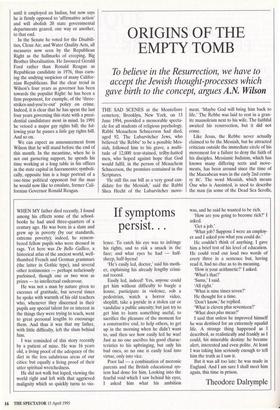If symptoms
persist. . .
WHEN MY father died recently, I found among his effects some of the school- books he had used three-quarters of a century ago. He was born in a slum and grew up in poverty (by our standards, extreme poverty); indeed, he remem- bered fellow pupils who were dressed in rags. Yet here was De Bello Gallic°, a historical atlas of the ancient world, well- thumbed French and German grammars (the latter in Gothic type), and several other testimonies — perhaps nefariously purloined, though one or two won as prizes — to intellectual endeavour.
He was not a man by nature given to excesses of gratitude, but several times he spoke with warmth of his old teachers who, whenever they discerned in their pupils any special talent for or interest in the things they were trying to teach, went to great personal lengths to encourage them. And thus it was that my father, with little difficulty, left the slum behind him.
I was reminded of this story recently by a patient of mine. He was 16 years old, a living proof of the adequacy of the diet in the less salubrious areas of our cities: but equally a living proof of their utter spiritual wretchedness.
He did not walk but loped, viewing the world right and left with that aggrieved malignity which so quickly turns to vio- lence. To catch his eye was to infringe his rights, and to risk a smack in the face; and what eyes he had — half- sheep, half-hyena!
'He's easily led, doctor,' said his moth- er, explaining his already lengthy crimi- nal record.
Easily led, indeed! Yes, anyone could get him without difficulty to burgle a house, participate in violence, rob a pedestrian, watch a horror video, shoplift, take a joyride in a stolen car or vandalise a public amenity; but just try to get him to learn something useful, to sacrifice the pleasure of the moment for a constructive end, to help others, to get up in the morning when he didn't want to, and then see how easily led he was! Just as no one ascribes his good charac- teristics to his upbringing, but only his bad ones, so no one is easily lead into virtue, only into vice.
Poor lad — a combination of moronic parents and the British educational sys- tem had done for him. Looking into the fearful void which I saw behind his eyes, I asked him what his ambition was, and he said he wanted to be rich. 'How are you going to become rich?' I asked.
'Get a job.'
'What job? Suppose I were an employ- er and I asked you what you could do.'
He couldn't think of anything. I gave him a brief test of his level of education. He could read out loud two words of every three in a sentence but, having read it, had no clue as to its meaning.
'How is your arithmetic?' I asked.
'What's that?'
'Sums,' I said.
'All right.'
'What is nine times seven?'
He thought for a time.
'Don't know,' he replied.
'What is eleven plus seventeen?' 'What does plus mean?'
I said that unless he improved himself he was destined for an extremely squalid life. A strange thing happened as I described, as realistically and frankly as I could, his miserable destiny: he became alert, interested and even polite. At least I was taking him seriously enough to tell him the truth as I saw it.
But it was all too late: he was made in England. And I am sure I shall meet him again, this time in prison.
Theodore Dalrymple


























































 Previous page
Previous page